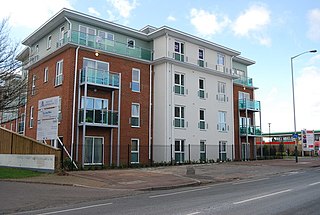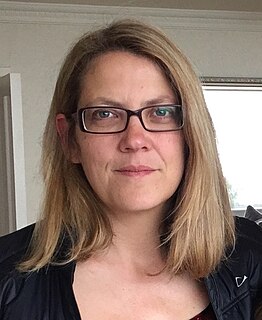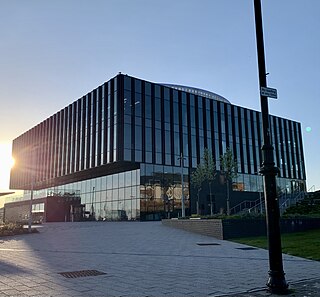
In Ireland and the United Kingdom, housing associations are private, non-profit making organisations that provide low-cost "social housing" for people in need of a home. Any budget surplus is used to maintain existing housing and to help finance new homes and it cannot be used for personal benefit of directors or shareholders. Although independent, they are regulated by the state and commonly receive public funding. They are now the United Kingdom's major providers of new housing for rent, while many also run shared ownership schemes to help those who cannot afford to buy a home outright.

A charitable organization or charity is an organization whose primary objectives are philanthropy and social well-being.
A social enterprise is an organisation that applies commercial strategies to maximize improvements in financial, social and environmental well-being. This may include maximizing social impact alongside profits for co-owners.
The United Kingdom is home to a widespread and diverse co-operative movement, with over 7000 registered co-operatives owned by 17 million individual members and which contribute £34bn a year to the British economy. Modern co-operation started with the Rochdale Pioneers' shop in the northern English town of Rochdale in 1844, though the history of co-operation in Britain can be traced back to before 1800. The British co-operative movement is most commonly associated with The Co-operative brand which has been adopted by several large consumers' co-operative societies; however, there are many thousands of registered co-operative businesses operating in the UK. Alongside these consumers' co-operatives, there exist many prominent agricultural co-operatives (621), co-operative housing providers (619), health and social care cooperatives (111), cooperative schools (834), retail co-operatives, co-operatively run community energy projects, football supporters' trusts, credit unions, and worker-owned businesses.
Community Energy Scotland is an independent Scottish charity established in 2008 that provides advice and financial support for renewable energy projects developed by community groups in Scotland. The stated aim of Community Energy Scotland is 'to build confidence, resilience and wealth at community level in Scotland through sustainable energy development'.
The Swindon Civic Trust is a voluntary organisation and registered charity established in Swindon, England in 2001. Affiliated to the Civic Trust of England and Wales, the organisation's stated aims are to improve the quality of new and historic buildings and public spaces, and to help improve the general quality of urban life.

Emergency medical services in the United Kingdom provide emergency care to people with acute illness or injury and are predominantly provided free at the point of use by the four National Health Services (NHS) of England, Scotland, Wales, and Northern Ireland. Emergency care including ambulance and emergency department treatment is only free to UK residents and a charge may be made to those not entitled to free NHS care. The NHS commissions most emergency medical services through the 14 NHS organisations with ambulance responsibility across the UK.
Healthcare in the United Kingdom is a devolved matter, with England, Northern Ireland, Scotland and Wales each having their own systems of publicly funded healthcare, funded by and accountable to separate governments and parliaments, together with smaller private sector and voluntary provision. As a result of each country having different policies and priorities, a variety of differences have developed between these systems since devolution.
LCDP is a community development organisation working across the city of Lincoln and the county of Lincolnshire.

The Prince's Charities is a non-profit organisation that has associations with Charles, Prince of Wales. The Prince's Charities, supported by The Prince's Charities Foundation, is based in the United Kingdom and comprises 19 organisations of which the Prince of Wales is patron or president; 18 were founded personally by Charles.
The Coalfields Regeneration Trust is a registered charity that works across the former Coalfield communities of England, Wales and Scotland. The Charity was founded in 1999. The Coalfields Regeneration Trust receives funding from the Department of Communities and Local Government for their work in English communities, The Welsh Government for their Welsh activities and the Scottish Government to cover their Scottish work. The Trust runs a number of initiatives and activities that make things happen at a community level in Coalfield areas. Each Country sets its own strategic objectives in line with local priorities.
Homes England is the non-departmental public body that funds new affordable housing in England. It was founded on 1 January 2018 to replace the Homes and Communities Agency (HCA).
A business improvement district (BID) is a defined area within which businesses are required to pay an additional tax in order to fund projects within the district's boundaries. The BID is often funded primarily through the levy but can also draw on other public and private funding streams. BIDs may go by other names, such as business improvement area (BIA), business revitalization zone (BRZ), community improvement district (CID), special services area (SSA), or special improvement district (SID). These districts typically fund services which are perceived by some businesses as being inadequately performed by government with its existing tax revenues, such as cleaning streets, providing security, making capital improvements, construction of pedestrian and streetscape enhancements, and marketing the area. The services provided by BIDs are supplemental to those already provided by the municipality. The revenue derives from a tax assessment on commercial property owners, and in some cases, residential property owners.
UK Community Foundations (UKCF) is a registered charity that leads a movement of community foundations committed to positive social change in the UK through the development of “community philanthropy”. Community philanthropy involves people from all parts of a community working together locally to use the financial and other resources available to them to improve others’ lives.

A Charitable Incorporated Organisation (CIO) is a corporate form of business designed for charitable organisations in England and Wales, similar to a Scottish Charitable Incorporated Organisation. CIO status is conferred by the Charity Commission for England and Wales on application by a charity, whether new or existing.

Public housing in the United Kingdom, also known as council estates, council housing, or social housing, provided the majority of rented accommodation until 2011 when the number of households in private rental housing surpassed the number in social housing. Houses and flats built for public or social housing use are built by or for local authorities and known as council houses, though since the 1980s the role of non-profit housing associations became more important and subsequently the term "social housing" became more widely used, as technically council housing only refers to housing owned by a local authority, though the terms are largely used interchangeably. Before 1865, housing for the poor was provided solely by the private sector. Council houses were built on council estates, known as schemes in Scotland, where other amenities, like schools and shops, were often also provided. From the 1950s, blocks of flats and three-or-four-storey blocks of maisonettes were widely built, alongside large developments of terraced housing, while the 1960s and to some degree the 1970s saw construction of many high-rise tower blocks. Flats and houses were also built in mixed estates.

Jess Steele, is the founder and director of Jericho Road Solutions and a community activist. Steele was a founder trustee of Hastings Pier & White Rock Trust which successfully campaigned to transfer the pier into community ownership and raised £14m for its renovation.

Community-led housing is a method of forming future residents into a 'building group' who contribute to the design and development of new housing to meet their longer term needs, rather than leaving all design decisions to a developer looking to maximise the immediate financial return.
Clarion Housing Group is the largest housing association in the United Kingdom with 125,000 properties across more than 170 local authorities. https://www.myclarionhousing.com/about-us Clarion Provides a home to over 350,000 people. https://www.myclarionhousing.com/about-us

HALO Urban Regeneration, known simply as The HALO, is a Scottish business innovation park, urban regeneration and business start-up support company, founded, based and headquartered in Kilmarnock, East Ayrshire, Scotland. The HALO Urban Regeneration was founded by entrepreneur Marie Macklin CBE in 2006 as HALO Urban Regeneration Company Ltd., having announced the project a few years prior to official funding and creation of the HALO Kilmarnock.








